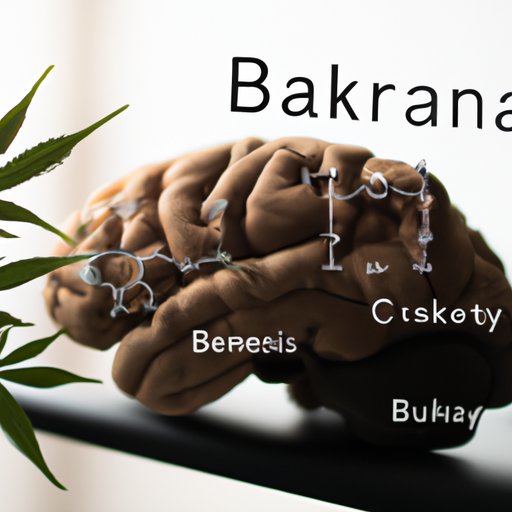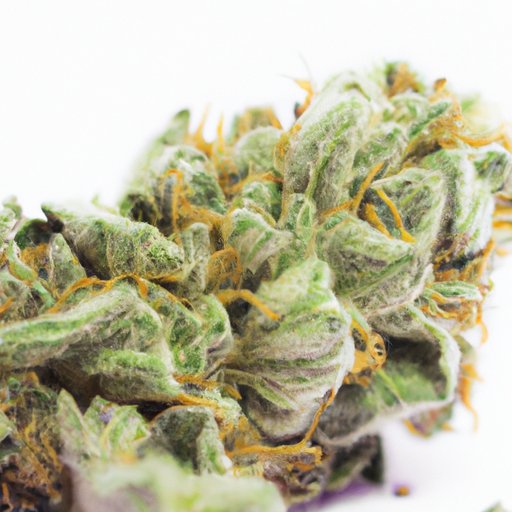Introduction
Cannabis (also known as marijuana, weed, or pot) is one of the most widely used recreational drugs in the world. It has been used for centuries to induce a range of effects, from relaxation to euphoria. But how does weed get you high? In this article, we’ll explore the science and effects of cannabis to gain a better understanding of how it works.
Cannabis is made up of a complex blend of chemicals, including over 100 compounds known as cannabinoids. The two main cannabinoids are tetrahydrocannabinol (THC) and cannabidiol (CBD). THC is responsible for the psychoactive effects of cannabis, while CBD is non-psychoactive and has been linked to potential therapeutic benefits. Additionally, cannabis contains hundreds of other compounds, including terpenes, which can influence the effects of THC.

Exploring the Science Behind How Cannabis Affects Brain Chemistry
To understand how weed gets you high, it’s important to examine the science behind how cannabis affects brain chemistry. When cannabis is consumed, the cannabinoids interact with receptors in the brain and body, triggering a range of different reactions.
Examining the Role of Neurotransmitters
The primary way that cannabis affects brain chemistry is through its interaction with neurotransmitters, which are chemical messengers that carry signals between neurons. When THC binds to receptors in the brain, it triggers the release of dopamine, which is associated with feelings of pleasure and reward. THC also increases the availability of anandamide, a naturally occurring neurotransmitter that is involved in regulating mood, appetite, and memory. While CBD does not directly interact with these neurotransmitters, it is thought to influence their activity indirectly.
Understanding the Difference Between THC and CBD
The effects of cannabis are largely determined by the ratio of THC to CBD. THC is the primary psychoactive compound in cannabis, and it is responsible for the “high” that is associated with consuming the drug. CBD, on the other hand, is non-psychoactive and has been linked to potential therapeutic benefits such as pain relief and anxiety reduction. Different strains of cannabis will have varying ratios of THC to CBD, so it is important to consider this when choosing which strain to use.
Investigating the Role of Terpenes in Cannabis-Induced Highs
In addition to cannabinoids, cannabis contains hundreds of other compounds, including terpenes. These compounds can influence the effects of THC, and some studies suggest that they may even be responsible for the distinct flavors and aromas of different cannabis strains. For example, the terpene myrcene is thought to be responsible for the sedating effects of certain strains of cannabis.
Examining the Different Ways Weed Can Alter Your Perception
Now that we’ve explored the science behind how weed gets you high, let’s take a look at the different ways in which it can alter your perception. Depending on the strain, the amount consumed, and the individual user, the effects of cannabis can vary greatly.
Discussing the Potential Short-Term Effects of Smoking Weed
The most common short-term effects of smoking weed include feelings of relaxation and euphoria, increased appetite, altered senses (such as heightened sight, sound, and smell), increased creativity, and impaired motor skills and coordination. In some cases, it may also cause anxiety, paranoia, and panic attacks, although this is more likely to occur in inexperienced users or those who consume large amounts.
Analyzing the Potential Long-Term Effects of Smoking Weed
The long-term effects of smoking weed are less well understood, but there is evidence to suggest that chronic use can lead to cognitive impairment, depression, and an increased risk of respiratory illnesses such as bronchitis. Additionally, cannabis use has been linked to an increased risk of psychotic disorders in people who are genetically predisposed to them.
Exploring the Impact of Different Strains on the Marijuana High
Different strains of cannabis can produce different effects, depending on their THC to CBD ratio and their terpene content. Sativa strains tend to be more energizing and uplifting, while indica strains are generally more sedating. Hybrid strains are a combination of both sativa and indica, and they can provide a mix of both energizing and calming effects.
Conclusion
Weed can get you high in a variety of different ways, depending on the strain, the amount consumed, and the individual user. The primary way that cannabis affects brain chemistry is through its interaction with neurotransmitters, and the effects are largely determined by the ratio of THC to CBD. Additionally, terpenes can influence the effects of THC and are responsible for the distinct flavors and aromas of different cannabis strains. Overall, it is important to understand the science behind how weed gets you high in order to ensure a safe and enjoyable experience.
Summary of Findings
This article explored the science and effects of cannabis to gain a better understanding of how weed gets you high. We examined the role of neurotransmitters, THC and CBD levels, and terpenes in cannabis-induced highs, as well as the potential short-term and long-term effects of smoking weed. We also looked at the impact of different strains on the marijuana high.
Recommendations for Further Research
Further research is needed to fully understand the effects of cannabis on brain chemistry and how it can alter perception. Additionally, more research is needed on the potential therapeutic benefits of cannabis, as well as the long-term effects of chronic use.
(Note: Is this article not meeting your expectations? Do you have knowledge or insights to share? Unlock new opportunities and expand your reach by joining our authors team. Click Registration to join us and share your expertise with our readers.)
